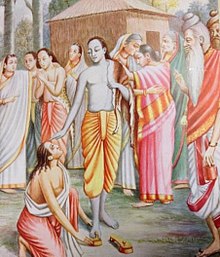| Paduka Sahasra | |
|---|---|
 Painting of the paduka (sandals) of Rama. | |
| Information | |
| Religion | Hinduism |
| Author | Vedanta Desika |
| Language | Sanskrit |
| Verses | 1000 |
The Paduka Sahasra (Sanskrit: पादुकासहस्रम्, romanized: Pādukāsahasram) is a Sanskrit stotrakavya (eulogistic poem) written by the Hindu philosopher Vedanta Desika in the 14th century CE. Comprising one thousand verses,[1] the subject of the poem are the paduka (sandals) of the deity Ranganatha of Srirangam, a form of Vishnu. The verses of the poem extol and associate these sandals with those of Rama, the protagonist of the Ramayana.[2] The poem is regarded to be one of Vedanta Desika's greatest works.[3]
- ^ Chari, S. M. S. (1 January 2018). Vaisnavism: Its Philosophy, Theology and Religious Discipline. Motilal Banarsidass. p. 28. ISBN 978-81-208-4135-2.
- ^ Rao, Ajay K. (3 October 2014). Re-figuring the Ramayana as Theology: A History of Reception in Premodern India. Routledge. p. 54. ISBN 978-1-134-07742-7.
- ^ Rajan, K. V. Soundara (1980). Glimpses of Indian Culture. Sundeep. p. 251.
© MMXXIII Rich X Search. We shall prevail. All rights reserved. Rich X Search
